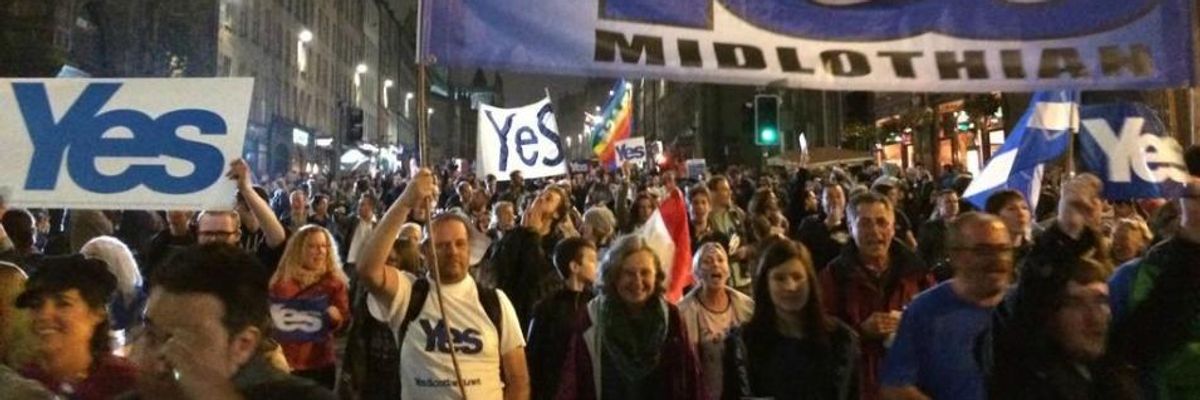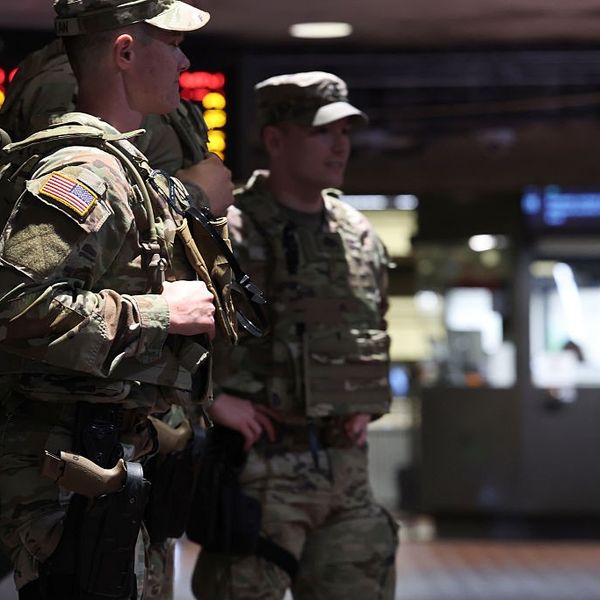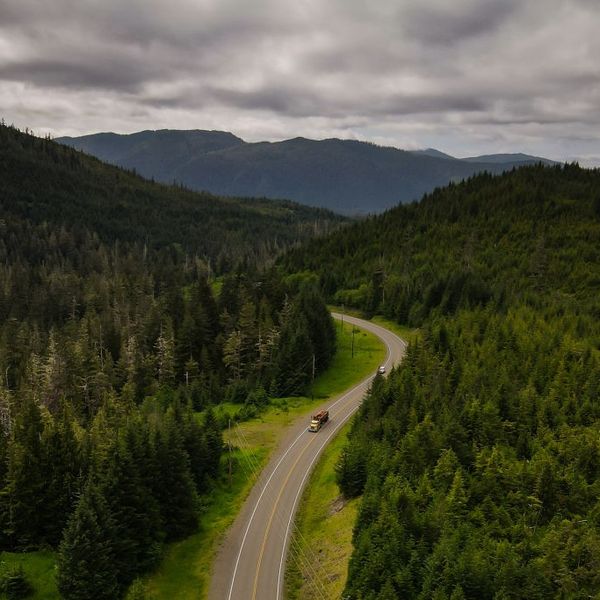
Scottish citizens marched through the city of Edinburgh on the eve of the referendum, declaring their support for a 'Yes' vote for independence. (Photo: Twitter/ @Radical_Indy)
Scots Head to the Polls for Historic Independence Vote
Turnout is expected to be enormously high, with predictions that 95% of Scots will cast a ballot to decide fate of nation
The people of Scotland are heading to polling stations and casting their votes for or against independence from the United Kingdom on Thursday in what has become a dramatic "too-close-to call" referendum the outcome of which would have vast implications for the future of both nations.
After more than 300 years as a part of the U.K. and living under the British monarchy, the most recent polling from Scotland shows that the 'Yes' campaign--which supports independence--is only narrowly behind the 'No' camp that is pushing for unity.
According to the Guardian on Thursday morning, "All the leading pollsters have now issued final polls suggesting a No win by 53% to 47%, or 52% to 48%, but Labour officials remain cautious, saying it is still unclear how undecided voters will break, or what could be the impact of a high turnout. As few as 200,000 votes could determine the outcome."
Strikingly, especially with undecided voters playing such a pivotal role in the result, voter turnout is expected to be enormously high, with predictions that 95% of Scots will cast a ballot.
The Guardian is providing live coverage of the day's election here.
And users of Twitter, under the hashtag #scottishindependence, are also tracking results and commentary on the vote:
An Urgent Message From Our Co-Founder
Dear Common Dreams reader, The U.S. is on a fast track to authoritarianism like nothing I've ever seen. Meanwhile, corporate news outlets are utterly capitulating to Trump, twisting their coverage to avoid drawing his ire while lining up to stuff cash in his pockets. That's why I believe that Common Dreams is doing the best and most consequential reporting that we've ever done. Our small but mighty team is a progressive reporting powerhouse, covering the news every day that the corporate media never will. Our mission has always been simple: To inform. To inspire. And to ignite change for the common good. Now here's the key piece that I want all our readers to understand: None of this would be possible without your financial support. That's not just some fundraising cliche. It's the absolute and literal truth. We don't accept corporate advertising and never will. We don't have a paywall because we don't think people should be blocked from critical news based on their ability to pay. Everything we do is funded by the donations of readers like you. The final deadline for our crucial Summer Campaign fundraising drive is just days away, and we’re falling short of our must-hit goal. Will you donate now to help power the nonprofit, independent reporting of Common Dreams? Thank you for being a vital member of our community. Together, we can keep independent journalism alive when it’s needed most. - Craig Brown, Co-founder |
The people of Scotland are heading to polling stations and casting their votes for or against independence from the United Kingdom on Thursday in what has become a dramatic "too-close-to call" referendum the outcome of which would have vast implications for the future of both nations.
After more than 300 years as a part of the U.K. and living under the British monarchy, the most recent polling from Scotland shows that the 'Yes' campaign--which supports independence--is only narrowly behind the 'No' camp that is pushing for unity.
According to the Guardian on Thursday morning, "All the leading pollsters have now issued final polls suggesting a No win by 53% to 47%, or 52% to 48%, but Labour officials remain cautious, saying it is still unclear how undecided voters will break, or what could be the impact of a high turnout. As few as 200,000 votes could determine the outcome."
Strikingly, especially with undecided voters playing such a pivotal role in the result, voter turnout is expected to be enormously high, with predictions that 95% of Scots will cast a ballot.
The Guardian is providing live coverage of the day's election here.
And users of Twitter, under the hashtag #scottishindependence, are also tracking results and commentary on the vote:
The people of Scotland are heading to polling stations and casting their votes for or against independence from the United Kingdom on Thursday in what has become a dramatic "too-close-to call" referendum the outcome of which would have vast implications for the future of both nations.
After more than 300 years as a part of the U.K. and living under the British monarchy, the most recent polling from Scotland shows that the 'Yes' campaign--which supports independence--is only narrowly behind the 'No' camp that is pushing for unity.
According to the Guardian on Thursday morning, "All the leading pollsters have now issued final polls suggesting a No win by 53% to 47%, or 52% to 48%, but Labour officials remain cautious, saying it is still unclear how undecided voters will break, or what could be the impact of a high turnout. As few as 200,000 votes could determine the outcome."
Strikingly, especially with undecided voters playing such a pivotal role in the result, voter turnout is expected to be enormously high, with predictions that 95% of Scots will cast a ballot.
The Guardian is providing live coverage of the day's election here.
And users of Twitter, under the hashtag #scottishindependence, are also tracking results and commentary on the vote:

